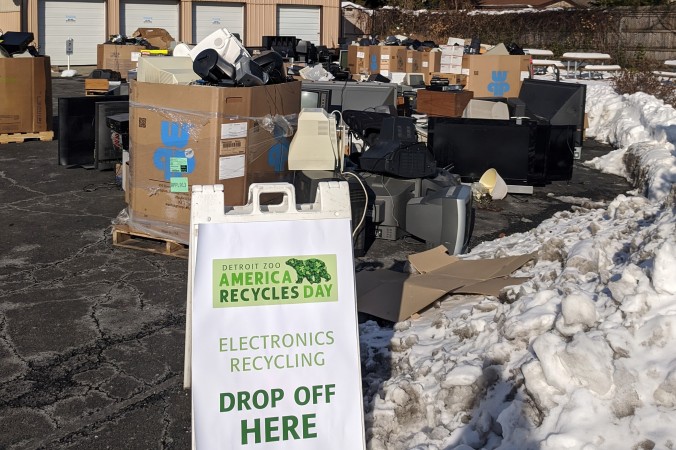
The Detroit Zoological Society celebrated America Recycles Day on November 15 by hosting a community e-cycling (electronics recycling) drive at the Detroit Zoo. We received a whopping 36,000 pounds (18 tons) of old tube televisions, outdated computer equipment and a variety of broken household electronics – the weight equivalent to seven rhinos! All of the material was recycled responsibly, alleviating our community members’ basements and avoiding the landfill.

Recycling electronics is vital to our environment since not only does it divert waste from Michigan’s landfills (according to the EPA, electronics accounts for 20-50 million tons of global waste), but it also reduces hazardous waste from seeping into the soil and groundwater. This is significant when you consider that the average old tube TV or computer monitor contains approximately 5 pounds of lead!
Recycled electronics are also filled with valuable minerals such as silicon, tin, copper, lead and gold; all of these minerals are required for future electronics. By recovering these minerals through recycling, we can reduce our reliance on mining raw materials from the earth. Mining creates a host of problems including deforestation, destruction of habitats and creation of pollution. Currently, only 12.5 percent of e-waste gets recycled, according to the EPA. Rather than focusing on mining jungles for raw materials for new electronics, perhaps we should start focusing on a more sustainable place – the urban jungle.

With the holiday season upon us and the latest and greatest electronic gadgets on many folks’ wish list, please consider the following actions:
- Resist upgrading. Challenge yourself to use your current device longer (cell phone, tablet, etc.)
- Purchase refurbished or older models. Support the recycling market and save yourself money
- Recycle your unwanted electronics. Rather than keeping them in a drawer or your basement, recycle and return the needed minerals to use for future electronics
Many electronic manufacturers (Apple, Samsung, etc.) will take back their products for recycling. For local recycling, SOCRRA, located at 995 Coolidge in Troy, takes electronics if you are a SOCRRA resident or business (member cities are Berkley, Beverly Hills, Birmingham, Clawson, Ferndale, Hazel Park, Huntington Woods, Lathrup Village, Oak Park, Pleasant Ridge, Royal Oak and Troy). Research your local recycling facilities and decrease your e-waste impact.
– Rachel Handbury is the manager of sustainability for the Detroit Zoological Society.




